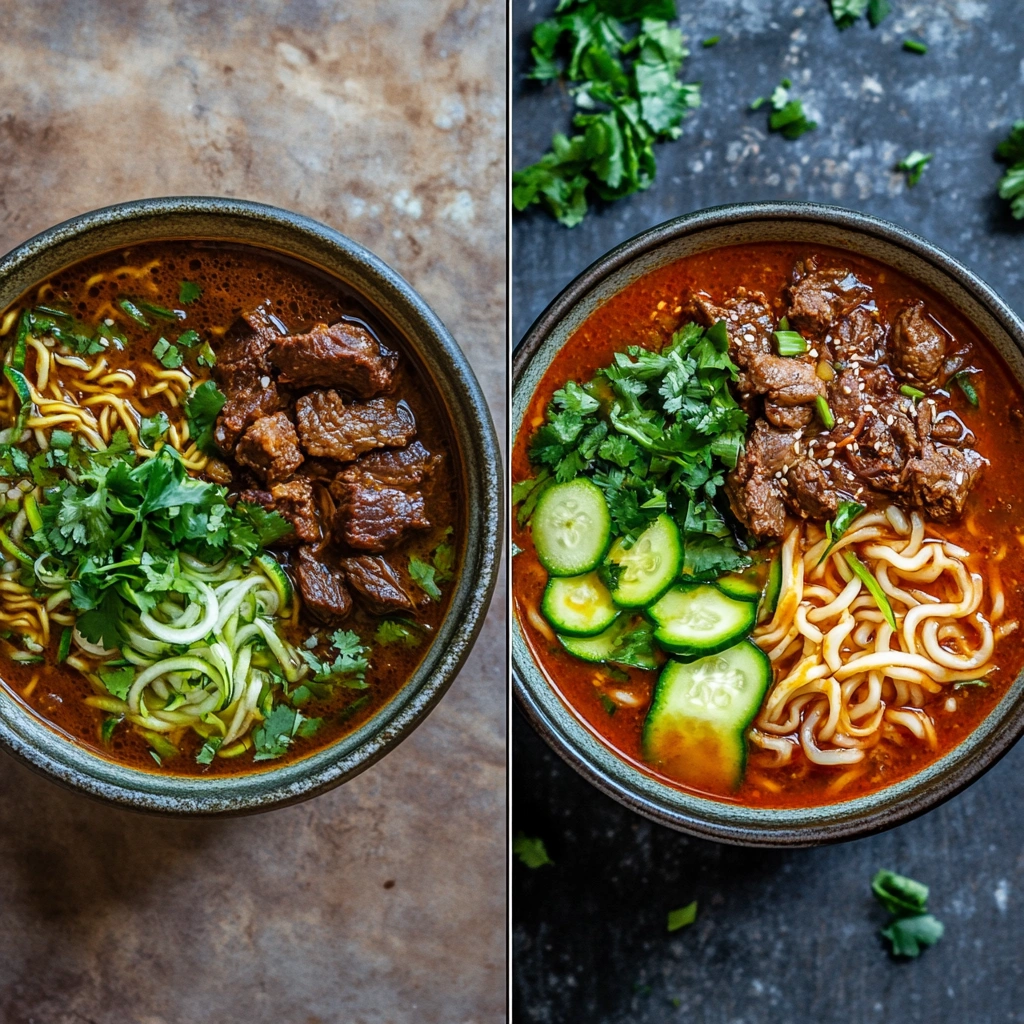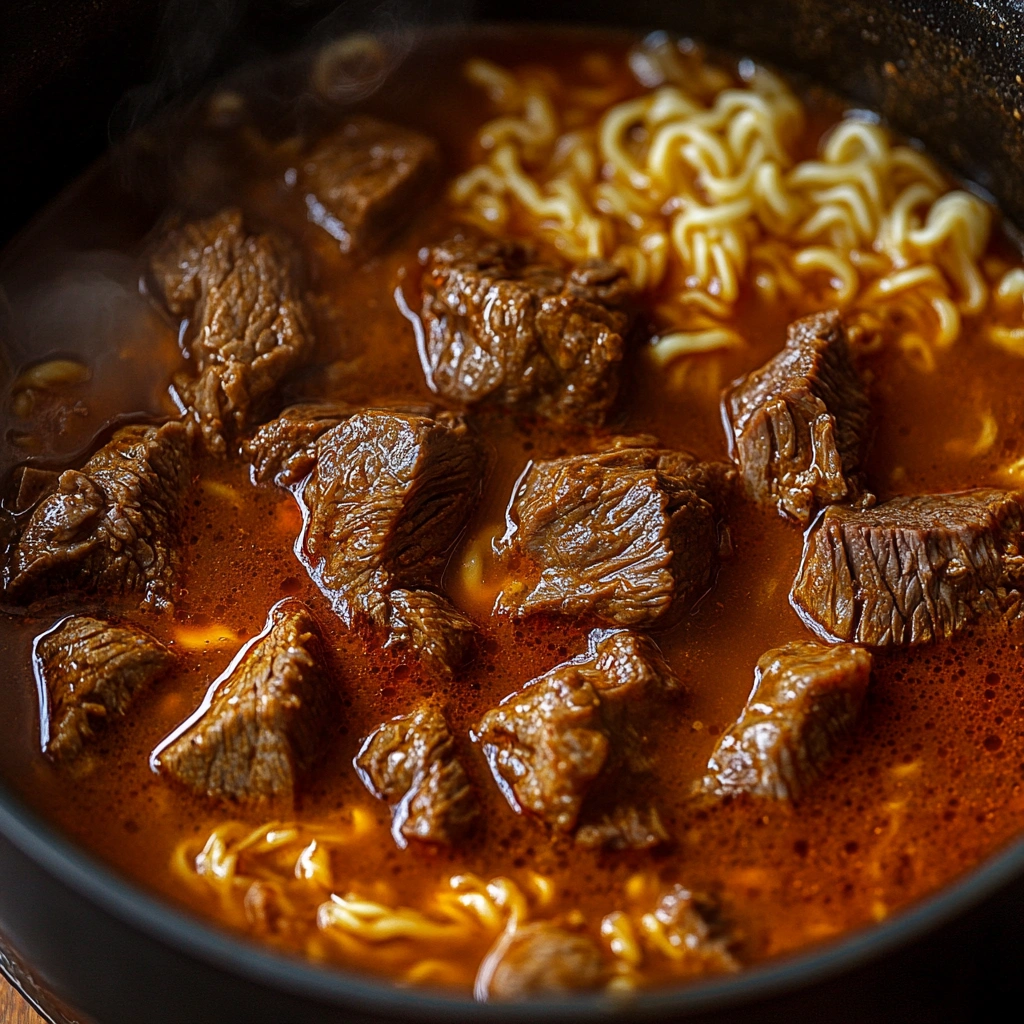Birria ramen health benefits have become a popular topic as this fusion dish combines the rich flavors of Mexican birria and Japanese ramen. While it’s a delicious and hearty meal, many are curious whether birria ramen is a healthy choice. In this article, we’ll break down its nutritional value, health benefits, and ways to make it a more balanced dish.
What is Birria?
Birria is a traditional Mexican stew, commonly made with beef or goat, marinated in a rich blend of dried chiles, chipotle, garlic, vinegar, and spices. It’s typically served as a stew or in tacos, but its recent adaptation into ramen has taken the culinary world by storm. Traditionally, birria is served at celebratory events like weddings and holidays, showcasing its importance in Mexican culture.
Health Benefits of Birria Stew
- Protein-rich: Beef or goat provides high-quality protein, essential for muscle repair and growth.
- Spice blend benefits: Ingredients like garlic and chilies contain antioxidants and anti-inflammatory properties.
While birria is flavorful and packed with nutrients, the use of oil and the long slow-cooking process often leads to a dish that’s high in fats and calories, which can be a concern for those on a calorie-conscious diet.
What is Ramen?
Ramen is a Japanese noodle dish known for its flavorful broth, chewy noodles, and a variety of toppings such as soft-boiled eggs, pork, and vegetables. Depending on the preparation, ramen can be a high-sodium, high-fat meal, especially if made with instant noodles.
The Ramen Revolution
There are many variations of ramen, from tonkotsu ramen (pork broth-based) to shoyu ramen (soy sauce-based), each with its unique flavor profile. However, the type of noodles and broth used can significantly affect the nutritional value of the dish.
- Fresh noodles typically contain fewer calories and additives compared to instant ramen.
- Broth quality is a key factor, as high-sodium broths can lead to water retention and increased blood pressure.
Combining these two dishes, birria and ramen, creates a meal that is both rich and satisfying but may also be nutritionally dense.
Is ramen healthy? Exploring the health risks and benefits explains more about the risks associated with consuming large amounts of sodium from ramen noodles.
Is Birria Ramen Healthy?

Birria ramen is undeniably a flavorful and hearty dish, but the question of whether it’s healthy depends on how it’s prepared and consumed. Let’s break down the nutritional components:
Calorie Content of Birria Ramen
One bowl of birria ramen can range from 600 to 1200 calories, depending on the portion size, ingredients, and preparation methods. The broth in birria is typically made from beef shank or short ribs, which are high in fats and calories. The ramen noodles, depending on whether they are fresh or instant, also contribute to the calorie count.
High-Calorie Ingredients:
- Beef or goat meat
- Ramen noodles (particularly if they are fried)
- Consomé (birria broth)
The combination of these high-calorie ingredients can make birria ramen a calorically dense meal, potentially making it unsuitable for those looking to limit their daily calorie intake.
Protein and Fat Content
Birria ramen is high in protein, thanks to the use of beef or goat. A typical serving can contain over 30 grams of protein, which is beneficial for muscle growth and overall health. However, the high fat content, particularly saturated fats from the meat and broth, can be a concern.
- Protein per serving: ~30g
- Fats per serving: ~15g (including saturated fats)
Saturated fats, particularly those found in animal products, can raise cholesterol levels and increase the risk of heart disease if consumed in large quantities. However, the dish’s high protein content can be a valuable component of a balanced diet.
Sodium Levels and Health Risks
One of the biggest concerns when it comes to birria ramen is its sodium content. The consomé and ramen noodles are often packed with sodium, especially if pre-made ramen noodles are used. The combination of salty broth and noodles can result in a sodium content of over 2000mg per serving—more than the recommended daily intake for an average adult.
Sodium and health: How to reduce sodium in your diet emphasizes the health risks of high sodium consumption, which can lead to elevated blood pressure and other cardiovascular issues.
Potential Benefits of Birria Ramen

While there are nutritional concerns with birria ramen, it also offers some benefits:
High in Protein
As mentioned earlier, the beef or goat used in birria ramen provides a high amount of protein. Protein is essential for maintaining and building muscle mass, particularly in active individuals. A single bowl of birria ramen can provide over 30g of protein, meeting a significant portion of the daily protein requirement for most people.
Contains Essential Minerals
The beef in birria provides minerals such as iron, zinc, and selenium, all of which are crucial for various bodily functions, including maintaining a healthy immune system and promoting efficient oxygen transportation.
Nutrient-Dense Vegetables
Traditional birria ramen toppings such as cilantro, onions, cabbage, and jalapeños offer important micronutrients like vitamins A and C. These vegetables add fiber to the dish, aiding digestion and promoting gut health.
Healthier Alternatives and Modifications for Birria Ramen
If you’re concerned about the health implications of birria ramen, there are ways to modify the recipe to make it more health-conscious.
Reducing Fat and Sodium
- Use lean cuts of meat like beef sirloin or chicken breast instead of fattier cuts like beef shank or short ribs.
- Opt for homemade broth with low sodium or no added salt.
- Skim the fat off the top of the consomé before serving to reduce calorie intake from fat.
By implementing these simple changes, you can make birria ramen a much healthier dish without sacrificing flavor.
Vegetarian or Vegan Birria Ramen
For those who prefer a plant-based diet, vegetarian or vegan versions of birria ramen are becoming more popular. Instead of using beef or goat, you can substitute jackfruit, mushrooms, or seitan for the meat. The broth can also be made from vegetable stock infused with the same chiles and spices used in traditional birria.
Lower-Calorie Options
If you’re watching your calorie intake, consider replacing the ramen noodles with shirataki noodles or zoodles (zucchini noodles). These alternatives are low in calories and carbohydrates, making them a perfect substitute for traditional ramen noodles.
Cultural Significance and Popularity of Birria Ramen
Birria ramen represents the fusion of two rich culinary traditions: Mexican and Japanese cuisine. The combination of birria’s savory, spicy flavors with the umami-rich broth of ramen creates a dish that satisfies on multiple levels.
The Fusion of Cultures: Mexican and Japanese
The fusion of birria and ramen has become particularly popular in food trucks across the United States, especially in cities like Los Angeles. This dish bridges two seemingly unrelated cultures, demonstrating how food can bring people together in exciting new ways.
FAQs About Birria Ramen
Is birria ramen high in calories?
Yes, birria ramen can be high in calories, with some bowls reaching over 1000 calories. This depends on the type of meat, noodles, and toppings used.
Is birria ramen gluten-free?
Birria itself is gluten-free, but traditional ramen noodles are made with wheat. To make a gluten-free version, you can use rice noodles or other gluten-free options.
Can I make birria ramen at home?
Yes! While it may take some time to prepare the birria stew, you can make birria ramen at home by following a few simple steps. Start by marinating and cooking the beef, then assemble the ramen with your choice of noodles and toppings.
Can birria ramen be frozen?
Yes, birria ramen can be frozen, but it’s best to freeze the components separately. Freeze the birria consomé (broth) and meat in airtight containers, and cook the noodles fresh when you’re ready to eat. This prevents the noodles from becoming soggy upon reheating.
How long does birria ramen last in the fridge?
Birria ramen can last up to 3-4 days in the fridge if stored properly. Keep the broth and meat in an airtight container, and store the noodles separately to maintain their texture when reheated.
Is birria ramen spicy?
Birria ramen typically has a moderate level of spice due to the use of chiles in the birria broth. However, the spice level can be adjusted by using fewer chiles or removing the seeds, or by adding spicy toppings like sliced jalapeños for extra heat.
What are some alternative toppings for birria ramen?
While traditional toppings include cilantro, onions, cabbage, and jalapeños, you can customize your birria ramen with other toppings like:
- Sliced avocado
- Pickled vegetables
- Soft-boiled eggs
- Roasted corn
These additions can enhance the flavor and nutritional value of your dish.
Is birria ramen keto-friendly?
Birria ramen can be made keto-friendly by replacing the ramen noodles with zucchini noodles (zoodles) or shirataki noodles. Both are low-carb alternatives that fit well into a ketogenic diet. Additionally, using beef as the main protein aligns with keto dietary guidelines due to its high fat content.
Conclusion: Is Birria Ramen Healthy?
In conclusion, birria ramen is a delicious, flavor-packed fusion dish that provides high protein and essential nutrients. However, due to its high calorie, fat, and sodium content, it may not be the healthiest option for those watching their diet. By making small adjustments, such as using leaner cuts of meat or opting for homemade low-sodium broth, you can enjoy birria ramen without compromising your health.
Ultimately, birria ramen is worth trying for its bold flavors and cultural significance, but moderation is key for maintaining a balanced diet.

